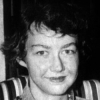Flannery O'Connor

Flannery O'Connor
Mary Flannery O'Connorwas an American writer and essayist. An important voice in American literature, she wrote two novels and 32 short stories, as well as a number of reviews and commentaries. She was a Southern writer who often wrote in a Southern Gothic style and relied heavily on regional settings and grotesque characters. Her writing also reflected her own Roman Catholic faith and frequently examined questions of morality and ethics. Her posthumously-compiled Complete Stories won the 1972 U.S. National Book...
NationalityAmerican
ProfessionNovelist
Date of Birth25 March 1925
CitySavannah, GA
CountryUnited States of America
The meaning of the story is the story.
Good and evil appear to be joined in every culture at the spine.
Does one's integrity ever lie in what he is not able to do? I think that usually it does, for free will does not mean one will, but many wills conflicting in one man. Freedom cannot be conceived simply. It is a mystery and one which a novel, even a comic novel, can only be asked to deepen.
I'm going to preach there was no Fall because there was nothing to fall from, and no Redemption because there was no Fall, and no Judgment because there wasn't the first two. Nothing matters but that Jesus was a liar.
My own approach to literary problems is very like the one Dr. Johnson's blind housekeeper used when she poured tea-she put her finger inside the cup.
The only way to the truth is through blasphemy.
It was not right to believe anything you couldn't see or hold in your hands or test with your teeth.
Children know by instinct that hell is an absence of love, and they can pick out theirs without missing.
Far be it for me to have worked it out in any abstract way. I don't know why the bull and Mrs. May have to die, or why Mr. Fortune and Mary Fortune: I just feel in my bones that that is the way it has to be. If I had the abstraction first I don't suppose I would write the story.
Christianity is a strangely cheery religion.
I believe the teacher's work is largely negative, that it is largely a matter of saying, "This doesn't work because ..." or "This does work because ..." The because is very important. The teacher can help you understand the nature of your medium, and he can guide you in your reading.
The reviewer always has hold of the wrong horror.
The beginning of human knowledge is through the senses, and the fiction writer begins where the human perception begins. He appeals through the senses, and you cannot appeal through the senses with abstractions.
Every morning between 9 and 12 I go to my room and sit before a piece of paper. Many times, I just sit for three hours with no ideas coming to me. But I know one thing. If an idea does come between 9 and 12 I am there ready for it.